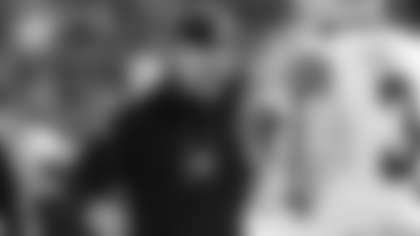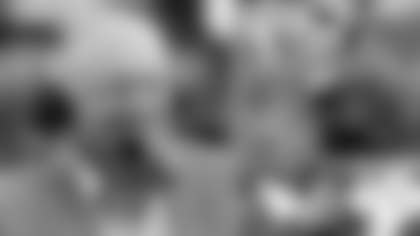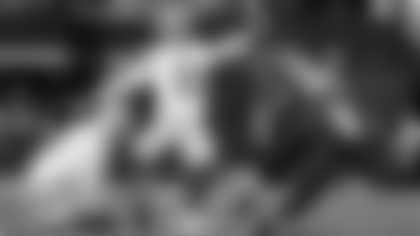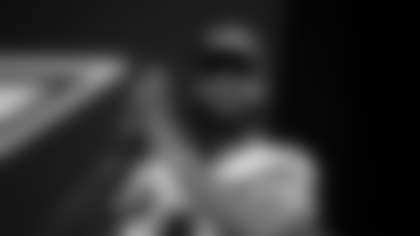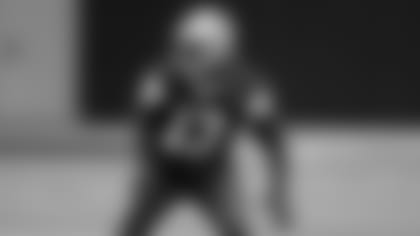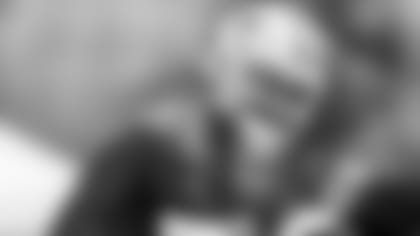This article will appear in an upcoming issue of Dallas Cowboys Star Magazine, focusing on the 2013 Pro Football Hall of Fame ceremony, featuring both Larry Allen and Bill Parcells. **For subscription information, please click here.**
The past two years, the Cowboys have been 8-8, just missing the playoffs with a disappointing finish in the final week of each season, bringing the frustration level within Cowboys Nation to seemingly an all-time high.
But imagine being 5-11 for three straight years and not even coming close to the postseason.
That's where the Cowboys stood following the 2002 campaign. A huge change was in order, and Jerry Jones knew it was time to make a splash that would not only change the current perception of the team, but more importantly the culture.
Bill Parcells was the choice.
While Parcells admits he enters the Pro Football Hall of Fame as a New York Giant – the first of four teams he coached in his illustrious career – his time in Dallas was vital for an organization that was spiraling downward.
While Parcells spent just four years coaching the Cowboys, making the playoffs twice but failing to win a postseason game, he has nothing but fond memories of his time in Dallas, and of his relationship with Jones, whom many pundits never dreamed would be able to work with the fiery head coach.
"I liked my experience there," Parcells says. "It didn't turn out perfect from a record-standpoint. I understand all of that. But I learned a lot and I enjoyed working there.
"Jerry and I are pretty good friends. I don't know whether or not people know that. We talk a little bit. I wouldn't say frequently. We talk a little bit. We talked recently. It's good. And I'm close with Stephen [Jones], too. I enjoyed working there with the Joneses. They were supportive and tried to help."
While there might be a national perception that Jerry Jones calls all of the shots and doesn't listen to those around him, especially his head coach, Parcells says in his time there, that was the furthest thing from the truth, calling it a huge misperception about the Cowboys' owner and general manager.
"Oh yeah, definitely. I think it's distorted," Parcells says. "I think there's a definite misperception. I just think everyone thinks a certain way. I didn't see it to be that way. I think Jerry is a good businessman and a good listener. What you have to do is make sense to him. You've got to make sense to him. If he thinks you're making sense, he'll alter his opinion. I enjoyed him. I like him. I like him a lot."
One of things for which Jones gets criticized the most is the way he apparently dabbles in the team's football operations, although as the general manager, doing so is certainly within his job description. Jerry is a hands-on owner, but according to Parcells, that passion is what drew him to the Cowboys job in the first place.
"We had some mutual friends. I was very close with Al Davis and I know Jerry was, too," Parcells says. "I had a little background information from Al – not about working for the Cowboys, just about what they were trying to do. I knew Jerry had a lot of passion for his work and his job and his organization. I could name a few organizations I don't feel that about – the owner is just blasé about 'if we win, we win, good; if we don't, that's all right.'
"But Jerry isn't like that. You want to be somewhere where it's important to the people and certainly it's a high-profile franchise without question. I just felt like those are the kind of things I look forward to. I was trying to do something at a place like that. I like them. I think they're a good group. I think they're passionate. I think they're trying to be successful in the business. Hey, that's all a coach can ask for."
If there is anyone who might be able to compare coaching situations, it would be Parcells, who coached for four different teams – the Giants, Patriots, Jets and Cowboys. Parcells also worked in the front office for the Dolphins.
But while the NFL doesn't make players or coaches distinguish what team with whom they are associated for the Hall of Fame the way baseball does, Parcells makes it clear.
"I'm going in as a Giant," Parcells says. "That was a place I spent 10 full years, two as an assistant and eight as a head coach. I certainly didn't spend more than four years anywhere else. I think, identification-wise, I'm more with the Giants than any other franchise, just because of longevity."
Parcells also says he was ahead of the time in terms of NFL coaches today. He sees coaches and players bouncing around from team to team much more than they did in the past.
"I was a product of what you see around the league now," Parcells says. "When I first came into the league, the league wasn't as transient in nature – players or coaches. Coaches stayed at one place and players stayed in one place. But with free agency and different ownership, the dynamic of the industry has changed a little bit. It's become more transient in nature. You see a guy like Mike Shanahan. He's a head coach in three different places. You see more of that than what you used to. It's just the nature of the business. It's a little more volatile and a little more transient. Change is a little more on the forefront than it was 30 years ago."
Parcells won two Super Bowls with the Giants during the 1986 and 1990 seasons. He had the Patriots in the Super Bowl against Green Bay in 1996, and took the Jets to the AFC Championship Game just two years later in 1998.
As for his time in Dallas, he never enjoyed the same postseason success. In fact, the Cowboys' drought without a playoff win didn't change on Parcells' watch. But that doesn't mean his time with America's Team wasn't meaningful.
He turned Dallas into a competitive franchise again almost immediately. The Cowboys went 10-6 in his first year of 2003, then after a disappointing 6-10 finish in 2004, the club went 9-7 in each of the next two seasons, 2005-06. The latter included another demoralizing playoff defeat, this time to the Seahawks, which would be Parcells' final game as a head coach.
The loss in Seattle – remembered more for Tony Romo's bobbled snap on a field-goal attempt in the final minute that would've put the Cowboys ahead – proved to be the final straw for Parcells, who was 65 years old at the time.
"That Seattle game … that had a real mental affect on me," Parcells says, referring to the Cowboys' 21-20 loss to the Seahawks in the 2006 NFC Wild Card round. "I really thought we had a chance to do something. And not only with Seattle, but Chicago the next week. I just thought we had a chance. That one beat me up a little bit."
Not long after that game, Parcells decided to hang it up, citing a lack of desire to continue, especially with the finish in Seattle still fresh on his mind.
"I was just really upset and saddened by that last game," Parcells says. "I just didn't want to try to do it again. I know from coaching all these years, if you're not mentally geared up for it – it's hard enough to do it anyway, but if you don't get really into it, it's impossible. I just thought enough was enough."
And although Parcells later returned to the NFL in a front-office role with the Dolphins, he never coached another game from the sideline.
To this day, Parcells still admits he has a few "what-if" moments about leaving the Cowboys after the 2006 season, particularly since they went 13-3 the following year under Wade Phillips.
"I'd say there were some times where I thought to myself, 'I should've tried one more time,'" Parcells remembers. "With that group we had, maybe we could've done something more. I don't know. But I just thought at the time it was the right decision to walk away."
Even though it's been seven years since Parcells roamed the sidelines in Dallas, his stamp on the team is still evident today.
The three most prominent figures on the current team were all brought in by Parcells, who helped select Jason Witten in the 2003 draft, his first with the team. He also played a role in getting Tony Romo to sign in Dallas as a rookie free agent that same year, and then in 2005, the Cowboys drafted DeMarcus Ware with the 11th overall pick.
Today, only seven players remain on the 2013 roster who played for Parcells in Dallas. Along with Ware, Witten and Romo, the others include Jason Hatcher, L.P. Ladoucuer, Jay Ratliff and Miles Austin.
But all of them were brought in by Parcells, including Romo, who caught the coach's eye with his raw intangibles.
"He was eager, bright and looking for an opportunity," Parcells recalls of Romo as a rookie. "I remember that he wasn't aspiring to just make the team. Sometimes guys that aren't drafted, their goals are moderate and expectations aren't high. But he wasn't like that. And once I saw him do things, I knew if we could just channel it the right way, he could do well.
"Tony was so athletic, he's smart, pretty tough, makes the throws, extend plays. I know he could get off track some of the time. You had to keep him on track and that's still the case with him, but I'm really proud of what he's become."
Romo remembers his first NFL coach staying on his case early and often.
"I loved Bill because, personality-wise, he could be real tough on me," Romo says. "I can take tough coaching. I'm fine with either side of that. But he could also be very funny at different times, at the same time turn the switch and be extremely in your face.
"I remember one time, he was looking over and said … 'you're never going to get it. You know what you are, Romo? You're a ball in high grass.' And I'm just sitting there. He's just waiting for me. 'Ball in high grass.' He's just waiting for me to ask. So I said, 'what, what does that mean?' …. 'LOST."
And admittedly, Romo was lost. He was an undrafted rookie from Eastern Illinois who was trying to catch up to the speed of the game.
"Bill is a big influence on me. He taught me a lot about the game and the approach," Romo says. "He had some great wisdom in a lot of areas. It wasn't just to manage the team. It was about people. It was about his ability to know the little things you might be thinking or might be going on in your head. I think he's pretty gifted at that. He can get on you. He'd be tough. You'd hate him one minute and love him the next."
While Romo arrived in Dallas during Parcells' first season with the Cowboys, he wasn't Big Bill's first quarterback in Big D.
That distinction went to Quincy Carter, who won the starting job in 2003 after an intense competition with Chad Hutchinson during the preseason. Carter led Dallas to a 10-6 record during that year, although the more surprising news was his sudden dismissal during the 2004 training camp. That's when the Cowboys cut Carter in one of the most shocking events in franchise history, considering how it basically came from out of nowhere. Eventually, the reports indicated Carter failed multiple drug tests, which led the Cowboys to move on.
"Quincy brought his problems on himself," Parcells said in a recent interview. "He had his opportunity as the starting quarterback of the Dallas Cowboys ... and he knows it. He brought his demise on himself. For some people, they don't want the bar to be too high because they just can't handle it."
The Cowboys went with Vinny Testaverde that season, reuniting the veteran with Parcells, who had coached him a few years earlier with the Jets. In 2005, the Cowboys then brought in Parcells's quarterback in New England, Drew Bledsoe. By 2006, it became clear to the head coach that Romo was ready to take over.
As for Witten, Parcells recalls wanting the Cowboys to draft him in the second round in 2003 with the 37th overall pick.
"I probably liked Witten more than most of the people in the War Room that year," he said.
Instead, the Cowboys opted for Al Johnson, a center from Wisconsin. But imagine the elation in Parcells and the rest of the team's coaches and scouts when they saw Witten still around for the 69th selection. The Cowboys grabbed their tight end, who now has more receptions (806) than any other player in franchise history.
Parcells was always keen on drafting tight ends, but he held them to a high standard, dating back to his coaching days with the Giants.
"I had a player named Mark Bavarro. He could do just about anything and was very tough," Parcells says. "So I would often mention him to Jason. And he sort of took to that. And now, Witten is as tough as it gets. Durability is a big factor in professional football. Give him credit. He's going to the Hall of Fame."
One of Witten's favorite Parcells stories stems from his rookie season, when the tight end suffered a broken jaw, much like the injury Bavarro had while playing for Parcells, who made sure to point out to Witten that Bavarro didn't miss a single game.
Witten missed one – which is now the only game he's ever missed – and could've possibly missed another as Parcells was closely monitoring his weight, which had dropped dramatically because he wasn't able to eat as much.
"He told me I couldn't play if I didn't make my weight," Witten recalled. "So the day he went to weigh me, I hid some 5-pound dumbbells in my pockets. I was able to get close enough in my weight and played that next game."
And he's never missed a game since.
Just like Witten had a "Giant" comparison when he was drafted, the same goes for Ware, whom Parcells promptly measured to Lawrence Taylor just minutes after drafting him in 2005.
"I think Ware is doing great – he's become one of the very best players in this league," Parcells says. "Those two, Witten and Ware, are really solid guys. You can rely on players like that. They've done a great job."
Even after Parcells stopped coaching, Witten said he still
"He was always pushing me to the point where I always felt like he was trying to get the best out of me," Witten said. "That mental toughness I have, I learned early on through him." [embedded_ad]
There's no doubt that Ware, Witten and Romo have become "Parcells Guys," a term that was often used during his stint in Dallas, which described players who had somehow won over Parcells' admiration. Just as Testaverde and Bledsoe had done, "Parcells Guys" would follow him to other coaching stops to reunite with a man they believed in and trusted.
One of those was Keyshawn Johnson, a former No. 1 overall draft pick of the Jets. He played for Parcells in New York and then rejoined him in Dallas for two years, 2004-05. To this day, Johnson says it means a lot to be called a "Parcells Guy."
"He understood who I was as a player and allowed me to be who I was," Johnson says. "He tried to change me, but as long as I did what I was supposed to do, it worked out for him. And like most of the coaches I ever played for, none of them ever had a problem with me because I always did what they asked. I think he was probably the most visible guy I played for. It means a lot in terms of his appreciation for me as a football player."
Johnson was known to bark back a little when Parcells would get on him. But the former wide receiver and current NFL analyst for ESPN says that can only happen if the player has the right credentials on the field.
"If you can't play, you can't bark. All the players who have are players who could play," Johnson says. "If you can hold your own, you can say what you want. Everybody's treated differently. You're never going to hear a player he released or cut say anything good about him. They're all going to say that he was hard, he was this or he was that. Well, that's because you couldn't play. And that's the bottom line."
Whether or not a guy could play might always be up for argument, but there was never a doubt that Parcells could certainly coach. He had great success during each of his stops in the NFL, his time in Dallas being yet another example of how he could turn around a franchise in a hurry.
"I still wish we could've done more when I was there," Parcells says. "I expected more, but I know our team improved. We had a lot better players when I left than when I came there. I don't think there's any question about that. And the year after I left, they went 13-3. You should give Wade Phillips a lot of credit for that. He did a good job with that, but I know that team was ready to do something, too. The talent level was certainly there."
And like many things that occurred in that four-year period, Bill Parcells was the major reason for that.





